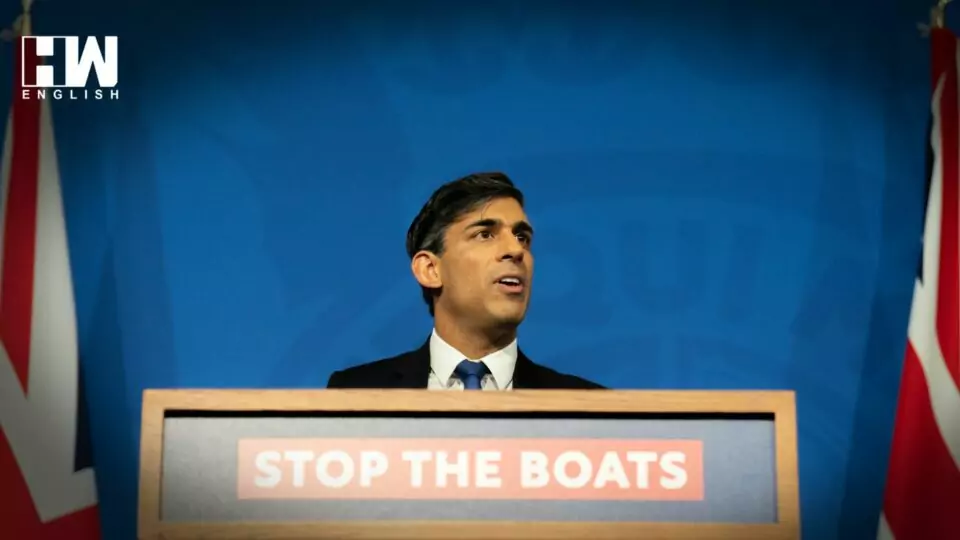After a drawn-out political battle spanning months, British Prime Minister Rishi Sunak has finally secured parliamentary approval for his controversial policy to deport some illegal migrants to Rwanda, clearing a significant hurdle in his bid to “stop the boats” crossing the English Channel.
The legislative logjam broke just after midnight on Tuesday when the unelected House of Lords, which had repeatedly blocked the bill with proposed amendments, conceded defeat and “recognized the primacy” of the elected House of Commons.
The breakthrough came hours after Sunak held a rare morning press conference to demand that the Lords stop obstructing his key proposal to deter migrants from undertaking perilous journeys across the Channel in flimsy boats. The Prime Minister had vowed that both houses would remain in session until the legislation was approved.
“For almost two years, our opponents have used every trick in the book to block flights and keep the boats coming,” Sunak told reporters in London. “But enough is enough. No more prevarication, no more delay.”
Under the divisive plan, some of those entering the UK illegally could be deported to Rwanda as a deterrent measure. However, the policy has faced fierce opposition from human rights activists who have denounced it as illegal and inhumane, vowing to continue their legal fight against it.
Despite Parliament’s approval, further court challenges may still delay the deportation flights, according to experts. “I don’t think it is necessarily home and dry,” said Tim Bale, a politics professor at Queen Mary University of London. “We will see some attempts to block deportations legally.”
Sunak has staked his political future on Rwanda’s policy, pledging to “stop the boats” a central part of his pitch to voters ahead of a general election later this year. Opinion polls have shown his Conservative Party trailing far behind the opposition Labour Party, and next week’s local elections are viewed as a barometer for how the parties will fare in the national vote.
The debate over small boat crossings has become a potent political issue in Britain, seen as evidence of the government’s failure to control immigration. The number of migrants arriving on small boats soared to 45,774 in 2022, up from just 299 four years earlier, as people seeking refuge pay criminal gangs thousands of pounds to ferry them across the Channel.
Sunak acknowledged that he wouldn’t meet his original deadline of getting the first deportation flights in the air this spring, blaming delays on continued resistance from the Labour Party. However, he vowed that the first flights would take off within 10-12 weeks, though he refused to provide details on numbers or exact dates, citing concerns about opponents trying to frustrate the policy further.
Sunak said that in preparation for the bill’s approval, the government has already chartered planes, increased detention space, hired more immigration caseworkers, and freed up court space to handle appeals.
He also suggested the government was prepared to ignore the European Court of Human Rights if it sought to block the deportations, stating, “No foreign court will stop us from getting flights off.”
The current legislation, known as the Safety of Rwanda Bill, is a response to a UK Supreme Court decision that blocked the deportation flights because the government couldn’t guarantee the safety of migrants sent to Rwanda. After signing a new treaty with Rwanda to beef up protections for migrants, the government proposed the new legislation declaring Rwanda to be a safe country.
The bill had been stalled due to the idiosyncrasies of the British legislative system. The House of Lords repeatedly offered amendments that were rejected by the Commons, leading to a back-and-forth between the two houses.
Critics of the government’s policy have refused to be drawn on their next move. Still, James Wilson, the director of Detention Action, which campaigns against human rights abuses in the immigration system, urged the public to look beyond the political stalemate and remember the human cost.
“Ultimately, the most important points here are not the ins and outs of Parliament and the things happening there,” he told The Associated Press. “In the end, this is about people. This is about people’s lives.”
The debate in Britain comes as countries throughout Western Europe and North America grapple with rising migration levels driven by factors such as war, climate change, and political oppression. While Sunak’s government has hailed the Rwanda policy as a necessary deterrent, critics argue that it fails to address the root causes of migration and violates international human rights norms.
As the first deportation flights loom, the legal and ethical battles surrounding the policy are far from over. The implementation of the Rwanda plan will the UK’s commitment to its international obligations and the government’s ability to navigate the complex challenges of migration in an increasingly interconnected and turbulent world.
Also Read: Manipuri Violence, Nijjar’s Death Cited In US Human Rights Report
As an independent media platform, we do not take advertisements from governments and corporate houses. It is you, our readers, who have supported us on our journey to do honest and unbiased journalism. Please contribute, so that we can continue to do the same in future.

